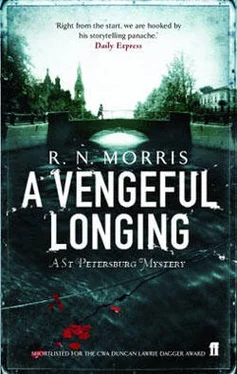R. Morris - A Vengeful Longing
Здесь есть возможность читать онлайн «R. Morris - A Vengeful Longing» весь текст электронной книги совершенно бесплатно (целиком полную версию без сокращений). В некоторых случаях можно слушать аудио, скачать через торрент в формате fb2 и присутствует краткое содержание. Год выпуска: 2008, ISBN: 2008, Издательство: Faber & Faber, Limited, Жанр: Исторический детектив, на английском языке. Описание произведения, (предисловие) а так же отзывы посетителей доступны на портале библиотеки ЛибКат.
- Название:A Vengeful Longing
- Автор:
- Издательство:Faber & Faber, Limited
- Жанр:
- Год:2008
- ISBN:9780571232536
- Рейтинг книги:3 / 5. Голосов: 1
-
Избранное:Добавить в избранное
- Отзывы:
-
Ваша оценка:
- 60
- 1
- 2
- 3
- 4
- 5
A Vengeful Longing: краткое содержание, описание и аннотация
Предлагаем к чтению аннотацию, описание, краткое содержание или предисловие (зависит от того, что написал сам автор книги «A Vengeful Longing»). Если вы не нашли необходимую информацию о книге — напишите в комментариях, мы постараемся отыскать её.
A Vengeful Longing — читать онлайн бесплатно полную книгу (весь текст) целиком
Ниже представлен текст книги, разбитый по страницам. Система сохранения места последней прочитанной страницы, позволяет с удобством читать онлайн бесплатно книгу «A Vengeful Longing», без необходимости каждый раз заново искать на чём Вы остановились. Поставьте закладку, и сможете в любой момент перейти на страницу, на которой закончили чтение.
Интервал:
Закладка:
R. N. Morris
A Vengeful Longing
‘Woe to those who are left only to their own powers and dreams,
and with a passionate, all too premature, and almost vengeful
longing for seemliness. .’
The Adolescent by Fyodor Dostoevsky, (translation by Richard Pevear and Larissa Volokhonsky)June, 1868
PART ONE
1
Raisa Ivanovna Meyer was sitting on the veranda of a rented dacha, listening to distant music from a pleasure boat as it filtered through successive screens of foliage. The notes that came to her were fragmented, barely music, but they compelled her attention more than the novel she had been drowsing over. She placed the book down on the marble table and looked up.
She was irritated, rather than soothed, by the broken strains. If only she could place the tune, then she could relax, and the music would have fulfilled its promise. But it set her nerves on edge, and the wafts of nostalgia that it carried with it only depressed her. Sometimes it seemed to be getting closer, clarifying into something almost recognisable, but immediately it would again recede and disintegrate. Raisa looked at her son, Grisha, as he leant over the circular table, utterly absorbed in the activity of copying the Daily Events section of The Voice . The neatness, indeed the beauty, of Grisha’s script provoked a surge of feeling in his mother: something fiercer, more complicated than pride. Pride was something she could never allow herself. But if she could not be wholly proud of Grisha, she would not be ashamed of him either. So they took their place on the front veranda, and Raisa met the questioning gazes of any passers-by with silent defiance.
Grisha’s pen moved swiftly, the letters forming with seemingly mechanical perfection. The lines ran true and straight, although the paper was not ruled. It was as if he was painting, not writing, the characters. There was something wonderful in her son’s obsession. It struck her at times as a blessing: a gift, truly, despite its pointlessness. The nib of the pen made little noises of contentment, chuckling scratches, as the ink flowed from it onto the surface of the paper. The absorption in his face frightened her. It was something she could never understand. What it said to her was that his devotion to this task was greater than any other feeling he was capable of. She knew that he needed her; that went without saying. And there were moments when only her clinging embrace was capable of calming and containing him. But this activity, the repeated copying of passages from the day’s newspaper, was the only thing he went to voluntarily. He chose this over her, and she was jealous of it.
Of course, it was better that he was occupied and quiet than upset in any way, and so most of the time she left him to it. There had been days when she insisted on his laying down his pen to accompany her on a walk along the linden avenue to the orchard. Sometimes he went peaceably, sometimes there were scenes. The greater his agitation, the more determined she would be that he should go with her. Why did she do it? She could not imagine whatever possessed her to initiate these storms. She wondered at her own perversity. Part of it she recognised as a craving for humiliation. But she had no right, really, to parade her son, like the banner of her wickedness. She felt a rush of shame. As it always did, it came down to her shame. Once she had arrived at that, everything fitted into place, and she realised she could have no complaints. Whatever happened, she could not complain.
This was where she belonged, here on the veranda with Grisha. He was her son, the son she deserved, the son she would always accept without question.
She looked out along the dusty road. A slight, stooped figure in a dark green civil service coat and cap was walking towards the dacha, carrying a black bag in one hand and a slim box, wrapped in colourful paper, in the other.
The music from the pleasure boat changed. It became simply the clashing of a cymbal and the boom of a bass drum. There was no hope now of melody.
Grisha did not look up, not even at his father’s footsteps on the veranda.
Dr Martin Meyer laid the box on the table without looking at his wife. ‘Eat them quickly, before they melt.’ The wrapping on the box announced Ballet’s Confectioners, Nevsky Prospekt.
Raisa glanced at her husband as he took off his cap and ran a hand through his damp hair, then pushed the bridge of his wire-rimmed spectacles back up his nose. His face was clean-shaven, but glistened with sweat. He narrowed his eyes as he penetrated the interior of the dacha with an ambiguous gaze, both searching and apprehensive. His mouth was set in a grimace of discomfort.
‘Chocolates?’
Dr Meyer appeared still distracted by the interior of his dacha, but he had heard his wife and answered her sharply. ‘Don’t I bring you chocolates every Saturday? Why should today be any different?’
If she was hurt by his bristling temper, Raisa hardly showed it, although perhaps the movement of her head did have something in common with a flinch. ‘It is rather warm today,’ she said quietly to the table.
At last Dr Meyer tore his eyes away from the inside of the dacha, and lowered them to consider his son’s handiwork. ‘Why do you let him do this?’ he murmured, though still he did not look at Raisa, so that at first she was not sure the question was addressed to her.
‘He enjoys it.’
Dr Meyer frowned self-consciously. It was as if he was waiting for her to see his displeasure, rather than considering what she had said. Raisa Meyer watched her husband closely, though with a detachment that shocked her. His face had once been illuminated by a passionate engagement; at times he had even been capable of impetuosity, as she well knew. Something petty, a kind of wretched, angry unhappiness, had driven out this vitality.
‘He enjoys it?’ Dr Meyer gave the word sarcastic emphasis. ‘How can we know what he enjoys or does not enjoy? Besides, this is a compulsion. One does not enjoy a compulsion. We must take steps to break it.’
‘Why?’
‘Because it is not healthy.’
‘Let’s not talk of him as if he were not here.’
‘Your sentimental. . interventions. .’ Dr Meyer kept his eyes downcast as he spoke, as though he were scanning his son’s writing for the words that he was struggling to produce, ‘… are not … conducive to. . progress.’
‘Sentimental interventions?’
‘Yes.’
‘I am his mother.’
‘Yes. And so. . you of all people. . must. . should. . be aware. .’ Dr Meyer broke off, pulling away the sheet that Grisha was working on. ‘Just look at this!’ The shock of his sudden deprivation showed in the boy’s whole body, which recoiled as if charged with a spring. His arms flew up and his head began to bob. A kind of grunting moan rose in his throat.
Raisa watched him with alarm, knowing how this would end. She wanted to smother him in an embrace, to press him into her, for she knew that such complete contact with his mother would be the only thing that would go some way to consoling him for his loss. But she felt oddly constrained in her husband’s presence.
Dr Meyer read from the sheet: ‘“On the eleventh of June on Vasilevsky Island, the partially decomposed body of an unidentified male was discovered by a party of picnickers.” And this! “A young woman, thought to be a prostitute, hanged herself from the stairwell of an apartment building on Voznesensky Prospekt.” And this! “In Tsarskoe Selo, the retired Collegiate Assessor Zarnitsyn killed his wife with a revolver before turning the weapon on himself. .”’
Читать дальшеИнтервал:
Закладка:
Похожие книги на «A Vengeful Longing»
Представляем Вашему вниманию похожие книги на «A Vengeful Longing» списком для выбора. Мы отобрали схожую по названию и смыслу литературу в надежде предоставить читателям больше вариантов отыскать новые, интересные, ещё непрочитанные произведения.
Обсуждение, отзывы о книге «A Vengeful Longing» и просто собственные мнения читателей. Оставьте ваши комментарии, напишите, что Вы думаете о произведении, его смысле или главных героях. Укажите что конкретно понравилось, а что нет, и почему Вы так считаете.












